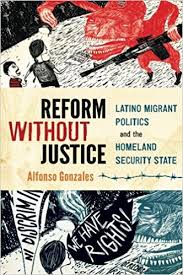Latino Migrant Politics, History and Theory
Making sense of US immigration policy and practice – especially what has happened in the past few decades with America and its neighbors to the south – is an extraordinarily complicated task. There are many moving pieces: local histories, transnational histories, international histories, changing laws, policies, practices and economics, and a complex overlay of perspectives and agendas. No simple narrative that can capture what has happened and why.
 Alfonso Gonzales, a professor of ethnic studies at the University of California, Riverside, provides a provocative and helpful take on the topic in Reform Without Justice: Latino Migrant Politics and the Homeland Security State. Gonzales’s research rests on a solid review of better-known historical events (public marches, legislation, speeches, etc.), interviews with more than 60 activists and many immigrants personally affected by the issue, and a powerful neo-Gramscian political theoretical lens. Antonio Gramsci was an Italian political theorist, communist, and anti-fascist who spent many years imprisoned by the Mussolini government. Gramsci’s work often revolved around questions of power and hegemony. He looked at ways that groups in power are able to remain in power, even in periods of transition and uprising. His insights – which cross many disciplinary boundaries – give tools to help map out complex issues of power, adjustment, and continuity.
Alfonso Gonzales, a professor of ethnic studies at the University of California, Riverside, provides a provocative and helpful take on the topic in Reform Without Justice: Latino Migrant Politics and the Homeland Security State. Gonzales’s research rests on a solid review of better-known historical events (public marches, legislation, speeches, etc.), interviews with more than 60 activists and many immigrants personally affected by the issue, and a powerful neo-Gramscian political theoretical lens. Antonio Gramsci was an Italian political theorist, communist, and anti-fascist who spent many years imprisoned by the Mussolini government. Gramsci’s work often revolved around questions of power and hegemony. He looked at ways that groups in power are able to remain in power, even in periods of transition and uprising. His insights – which cross many disciplinary boundaries – give tools to help map out complex issues of power, adjustment, and continuity.
Gonzales harnesses a reading of Gramsci to explore how, during a period of national shifts in political parties and massive street protests advocating for immigrant rights, conditions for so many Latino/a immigrants worsened. The US experienced a period where many thought that ground up change would lead to an opening of opportunities and supports for immigrants. It did not transpire. Governmental controls increased. The political culture worked against comprehensive immigration reform and the extension of immigrant rights. To explain this, Gonzales identifies an anti-immigrant hegemony that cuts across parties, social groups, and other categories. This “structure” has grown in power, too, under the Trump administration. Absolutely central to that effort, Gonzales effectively argues, is the criminalization of the immigrant.
Adding to the power of the narrative is Gonzales’s willingness to occasionally insert his voice as an immigrant. He is judicious but when he does insert himself, it resonates. Gonzales is an activist who cares. His work, as a theorist and as a chronicler of change, is valuable.
Reform Without Justice offers a persuasive lens to help to understand current American political culture and politics when it comes to immigration and Latinos.
David Potash